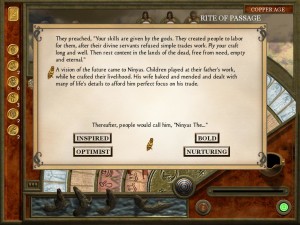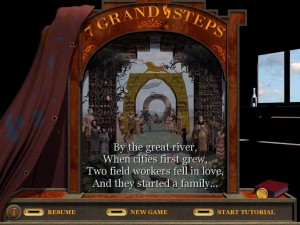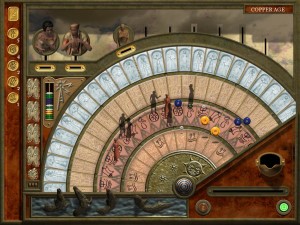As an avid board gamer, I was intrigued by the ideas surrounding this particular title. At first glance, it looks like a simple digital board game in which the player will be moving pawns around a giant wheel to simulate the lineage of families and generations. People who assume this to be the case would be half correct, as the game is much more complex than I originally gave it credit for. It draws gameplay mechanics from games like “Civilization” and “The Sims”, the former for the ever-progressing tech tree and the latter for the way your families evolve over a period of time. While all of this is going on, the game is telling you a story, one that you are helping to create. The question remains however, does it stand the tests of time and the “almighty” gamer-dad who will be reviewing it? Before I answer that, I’d like to thank Keith Nemitz from Mousechief Co. for providing me with a free review copy.
Editor’s Note: For simplicity’s sake, I’ll be referring to this game as “7 Grand Steps” even though I truly mean “7 Grand Steps, Step 1: What Ancients Begat”.
The main menu allows the player to start or continue a game, view tutorials, navigate a mini-manual of sorts, and adjust game options. Clicking the “i” on the main menu will allow you to address the game options and view the manual all in one sitting, with the former touching on fullscreen and music volumes. There is no screen resolution or extra settings here, though I found that I really didn’t miss them all the much. The window, when not in fullscreen mode, can’t be resized unfortunately. As far as a profile system goes, you’re stuck with one profile, though you can pick which game you’d like to continue when you resume a previously saved game. So while there’s no profile system in place per se’, you can play multiple games at one time and switch between them at will.
A single game can take hours to play, all of which happens via a turn-based system. For those of you familiar with the “Civilization” series, you’ll recognize just how many times that it’s possible to click that “next turn” button in one sitting. It’s fairly easy to get caught up and swept away in complex turn-based strategy games, and it’s safe to say that I experienced the same instinctive draw here. Turns in “7 Grand Steps” aren’t nearly as complicated as you might find in “Civilization”, but you will be making a lot of them. After all, you will be spanning multiple eras as you experience the rise of western civilization. This can make the game feel repetitive at times, but it rewards those who play it in short bursts and stick with it over the long haul.
The interface is a bit overwhelming to new players, but once you play a few turns, you’ll quickly get the hang of how everything ties together. The wheel represents time, turning with each click of the unmarked “end turn” button. Spaces on the wheel represent different branches of technology. Colored beads (legend markers) are earned as you play, which serve to complete a goal of your choice. Choosing and meeting the technological goal, for example, causes a new technology to be introduced onto the wheel. The player will be in control of pawns that represent the adult members of your current family, which is usually a husband and wife. It’s possible (and necessary) for the couple to have children, though they won’t have pawns. Character deaths can happen as part of a narrative choice, or if their pawns fall off the back-end of the wheel by failing to move forward. Needless to say, this is a bad thing.
The player will be moving their pawns around the board via tokens. Each game turn, you’ll be dragging and dropping tokens into your family’s character slots (limit to one token per character per turn). After placing a token into a slot, that character will move to the closest space on the board that matches the symbol on the token. Once a character has been moved in this way, their token slot closes for the remainder of the turn. Children, as mentioned above, don’t have pawns. You can task them to either learn, play, or work. Players can opt to work for tokens instead, which sends them backwards along the wheel toward the crocodiles. Players will need to do both (spend and work) so as to collect beads while maintaining a plentiful token supply.
When you put all of the above together, you’ll start seeing a pattern in what you’ll be doing from turn to turn. Primarily, you’ll be earning tokens, taking a look at the board and where you characters currently are in relation to the spaces around them, and spending tokens to move them around. There’s a bit of strategy involved in which tokens you want to assign to what character. Children, for example, can be taught specific things by providing them with particular tokens. When they get older, they’ll actually generate the very skills (tokens) that they were taught as a child. How you advance your pawns around the board will ultimately affect the narrative that plays out and how successful your family line will be.
There are a few other things that go on while you’re trying to keep your family afloat and moving forward. From time to time, narrative events pop up that force you to pick a choice. I may be showing my age, but they’re sort of like those old “Choose Your Own Adventure” books you may have read as a kid…assuming of course, that you’re a dinosaur like me. These choices are vital to how your family line may carry on and some even result in the death of a character or family. Rather than make you start over from scratch when this happens, the game will put you in control of a sibling (if you have one). Instances where this occurs can be a huge loss, as you’ll lose all of the progress that particular character / family member made. My only complaint with these dialogue pop-ups is that it’s not always clear HOW your choices affect future generations.

When your parent tokens are of the appropriate age, you’ll choose one of their children to carry on the family line.
Mini-games take a front seat from time to time, though whether or not you see them depends on whether or not you make it to the ruling track. As your family increases in social standing, their pawns will move to a different track on the wheel. The farther your pawns are from the center of the wheel, the higher your class and the value of beads that you’ll have access to. If you manage to make it to the ruling track (the outermost track), you’ll engage in a mini-game unique to your era. These mini-games, I found, are pretty complex. We’re not taking “click the monkey to win a prize” ad-banner difficult, we’re talking complex strategy game difficult. They take a while to finish and are probably include the most complex aspects of the game itself. Luckily, you’ll only need to address them once per game turn and you can let the computer auto-act for you, if you’re not up to the challenge.
I did run into a bit of a difficulty curve and I admit, I’m still not completely clear on how everything works. The main menu’s “i” – “Main Info” feature did address a lot of the questions I had, so I highly recommend checking it out before you begin playing. The game does take you through a basic tutorial when you play for the first time, but it doesn’t get as specific. How far your pawns move backward when working for tokens, for example, was something I didn’t learn until I went back to the main menu and started reading the interactive manual. The game is much more complex than the basics I laid out above, which may intimidate those who just came into the game for a casual experience. You’ll have to manage your kids, contend with sibling rivalry, deal with peers / neighbors on the wheel, pick up beads before your neighbors do…it’s a LOT to take in your first time out.
As a gaming addict and a games journalist, I’ve played and reviewed a ton of games. With that said, “7 Grand Steps” is unlike anything I’ve ever experienced. “7 Grand Steps” is truly a unique take on story telling with successfully integrated board game mechanics. There are times where I felt that the results of my choices were too based on luck, especially the parts where the “Choose Your Own Adventure” bits came into play. Part of me accepts this as simply telling a story and accepting the consequences, but part of me wants to choose the correct choices in order to win the game. It’s difficult for someone with my mentality to simply “survive”, as I try to excel at everything I do. Since getting through an entire game can take over five hours, it can be frustrating to see one bad decision ruining your family line. By the same token, this mechanic offers a lot of replay value as those who enjoy playing will undoubtedly go back and try to do things differently.
Is it worth its current price tag of $14.99 (as of 7/16/13)? There are a few sixty dollar games (which shall remain nameless) that only offer a five-hour single player campaign. It’s easy to pump hours/days into this game without blinking or breaking a sweat and to me, that signifies a great amount of value and entertainment. Yes, it’s that deep. Those seeking instant gratification will not enjoy “7 Grand Steps”, but for everyone else, I’d recommend trying out the free demo via the official site (link below) and giving it a go.
Final Verdict: 8/10
—
You can learn more about and purchase the game via the following websites:
http://store.steampowered.com/app/238930/
http://p10.hostingprod.com/@mousechief.com/7GS/by_Mousechief.html
You can view video play sessions here:
http://www.youtube.com/watch?v=MaB3yGWUuyA
http://www.youtube.com/watch?v=V9tRXba-uk4


